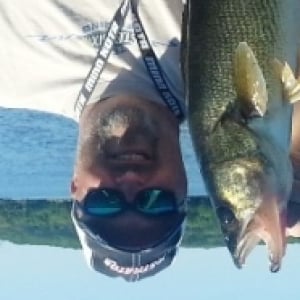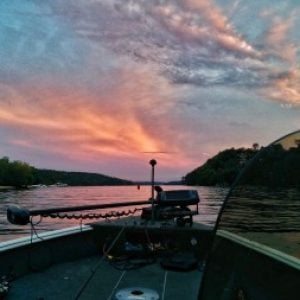So, with previous boats that I have owned. I never really “winterized” per say. I always just changed lower unit fluid when it started to get cold, and then continued to run my boat off and on throughout the winter. (The Milwaukee harbor is pretty much fishable all year long). Never had any issues. Well, now that I have a brand new (much more expensive) boat, I’m a little more nervous about the possible effects of freezing temperatures on it. I do not plan to run my boat this winter, so my question is: When do I need to worry about taking it into the dealer and shutting her down for the season? Its supposed to dip below freezing this weekend for the first time of the year this weekend, but then warm back up next week. Is there more to worry about with these newer boats, or should everything be okay until we see consistent freezing temps?
IDO » Forums » Fishing Forums » General Discussion Forum » Winterization?
Winterization?
-
November 16, 2016 at 10:08 am #1650941
Depends on definition of “newer”: HP? Electronics?
Some guys would cringe, but I used to run my boat all winter so never fully “winterized” it. Kept the lower unit fluid changed(and free of water), and would fire it up dry for just a few seconds after loading at the end of the day to blow the water out of it. Would bring my electronics inside and plug the livewell for the year. That’s about it. Maybe I’m must dumb and lucky, but never had a problem.
-Rev
November 16, 2016 at 10:11 am #1650942On most outboards, gravity drains any leftover cooling water for you, so there is little call for extra measures. If you are really concerned, you can “feed” RV antifreeze into your engine with a system that’s fairly cheap and easy to rig up.
As you mentioned, change the lower unit lube.
Top up the fuel, preferably with non-ox and add Stabil. Do NOT add other additives that are designed for fuel system cleaning.
If at all possible, when the boat is last used, disconnect the fuel hose and let the engine run itself out of fuel. This heads off a lot of problems.
Be sure all pumps and livewell drains are dry. If in doubt, use RV antifreeze in the drains to be sure.
Disconnect the battery or throw the master switch to “All Off” if equipped. Use a high quality batter maintainer on all batteries if possible.
Change your water separator and fuel filter as recommended.
Use anti-rodent measures. Mothballs, rodent traps, whatever is needed.
Grouse
 John SchultzInactivePortage, WIPosts: 3309November 16, 2016 at 10:26 am #1650949
John SchultzInactivePortage, WIPosts: 3309November 16, 2016 at 10:26 am #1650949You should be able to do everything you need to do to winterize on your own and save yourself some money. Change the lower unit lube on both your motors, change the oil, grease your prop shafts, set your livewell on recirculate and put a couple gallons of RV antifreeze in it and run it to get the pumps full of antifreeze. Plug your on-board charger in and park it for the winter. Put a bucket under your livewell drain just in case it doesn’t fully seal so you don’t end up with antifreeze all over your garage floor.
November 16, 2016 at 10:30 am #1650951If at all possible, when the boat is last used, disconnect the fuel hose and let the engine run itself out of fuel. This heads off a lot of problems.
Id agree this is ok for a basic 2 stroke or 4 stroke motor. I would never do this to a HPDI or Opti motor. E-Tecs have an built in storage function. See owners manual.
-J.
November 16, 2016 at 11:02 am #1650969How about fogging the cylinders? Is it necessary? I’ve always done the steps listed above to my smaller outboards and never had problems but my new to me 05 150ho states to fog the cylinders. Some of my friends with bigger outboards fog and others don’t.
November 16, 2016 at 11:39 am #1650976Thanks for the replies gents! Since I just bought the boat this spring, dealer is going to winterize for free, whenever I want to do it. He said that they change lower unit fluids, change oil, fog cylinders, grease fittings, and prop shafts as well as a few other things I may have forgotten. I know to take the graphs off, as well as keep the charger plugged in. I guess my real question was, WHEN should I get this done? I’ve heard that you don’t need to worry until temps are below freezing for over 36hrs straight, but not sure if that’s true or not?
November 16, 2016 at 11:45 am #1650978Also, not sure if it makes a difference. Motors are 2014 Yamaha 150 four stroke and 2016 9.9 four stroke kicker
November 16, 2016 at 12:47 pm #1650990I guess my real question was, WHEN should I get this done?
You need to address ALL water items prior to a temp drop under freezing.
Make sure you lower units are completely drained. Trimming the motors down. If the lower unit cannot be completely lowered, jack up the rear of the boat trailer to allow full trim down.
No water in livewells or baitwells or bilge including fill and drain lines. Either fill/drain with RV anit-freeze or blow out with compressed air.
Everything else can wait.
-J.
November 16, 2016 at 1:00 pm #1650993How about fogging the cylinders? Is it necessary? I’ve always done the steps listed above to my smaller outboards and never had problems but my new to me 05 150ho states to fog the cylinders. Some of my friends with bigger outboards fog and others don’t.
If you are going to let it set for an extended period of time, I would definitely say you need to fog it. Its probably not going to cause a severe engine failure the first year or two of not fogging but over time it can. I have replaced a lot of engines over the years where you can see the pitting in the bearing and the rust lines in the cylinders from not being fogged when put away. The other thing I have seen is rodents making homes in cylinders over the winter because they were not, if it would have been fogged more than likely the mice would have wanted nothing to do with it, and the engine manufacturer may have done something for warranty for him.
November 17, 2016 at 11:54 am #1651108Thanks guys! Pulled the graphs, turned each engine over to make sure now water in the prop, and ran a little RV antifreeze through the live well lines. Should be good through the weekend, then plan on getting back on the water after the cold snap for a few more weeks hopefully.
November 17, 2016 at 12:57 pm #1651119Change the lower unit lube. Put Sea Foam in the gas tank, ideally a high concentration. Run it a few minutes to get sea foam into the engine, ideally for the last full tank before winter. With that, you’re 90% good to go.
If it’s not a DFI engine and it’s going to sit a while, run it out of gas. If it’s carbureted, spray sea foam into the carb while it’s running to get a bunch in there. Works like a charm for me in every engine I own (except the Etec, for which I just change lower unit lube, put the sea foam in the tank (it’s always in there), and then follow the winterization procedure if it’s going to sit for a while).
If it’s going to sit a good long while, you can spray deep creep or sea foam spray into the cylinders to fog them. I haven’t bothered except with one engine that I knew was going to sit for at least a full year.
November 18, 2016 at 9:28 am #1651253Plug your on-board charger in and park it for the winter.
I have a Minn Kota Terova with on-board chargers. Would I be safe to just leave the batteries in the boat over the winter but plug them into an outlet?
November 18, 2016 at 10:31 am #1651273Check your water levels first. Then your on board charger (assuming it drops to a trickle charge when needed) will be fine. If you have a charger, use it.
As long as your batteries are full of (distilled) water and fully charged, they will be fine over winter without a charger.
 Carl S
Posts: 60November 21, 2016 at 1:37 pm #1651802
Carl S
Posts: 60November 21, 2016 at 1:37 pm #1651802How do people like to winterize their boats if they are going to use them off and on throughout the winter? I’m probably heading out this week one last time before muskie season closes but I’ll keep going down to pool 4 throughout the winter when there’s a nicer day. Motor is a 115 Optimax ProXS.
November 21, 2016 at 4:58 pm #1651845How do people like to winterize their boats if they are going to use them off and on throughout the winter? I’m probably heading out this week one last time before muskie season closes but I’ll keep going down to pool 4 throughout the winter when there’s a nicer day. Motor is a 115 Optimax ProXS.
I do all the maintenance stuff mentioned by others, keep fresh non ethanol gas in as possible, and just use it. Keep water out of lines and everywhere, and use it whenever I want.
One thing to add if going out in really cold temps… I’ve posted this before. My first time I put the boat in going out in very cold temps, I almost pulled it back out and gave up after an almost five hour ride to pool 4. Got lucky, there was a regular there that pointed out why my new boat wasn’t peeing water was the thermostat was doing just what it was suppose to. It wouldn’t pee until it was warmed up. I was freaking out the entire wait.
I do spray some fogging oil in each spark plug hole if there is a chance it could sit longer. Just a little time, and care pulling the cover.
You must be logged in to reply to this topic.